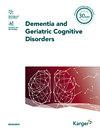Efficacy of acetylcholinesterase inhibitors in the logopenic variant of primary progressive aphasia.
IF 1.9
4区 医学
Q3 CLINICAL NEUROLOGY
引用次数: 0
Abstract
INTRODUCTION For over twenty-five years, cholinesterase inhibitors (ChEIs) have been the main symptomatic treatment for Alzheimer's disease (AD). Several meta-analyses have supported their efficacy in various neurocognitive, functional, and behavioral aspects of amnestic AD. Over 86% of cases of the language variant AD are caused by a similar pathologic process than AD, yet no study has examined the efficacy of ChEIs in this AD variant. We aimed to explore the efficacy of ChEIs in the treatment of language AD by comparing their evolution on the MMSE to that of treated amnestic AD patients. METHODS A retrospective chart review was performed in forty-five patients with language AD and fifty-two patients with amnestic AD. Both groups were similar regarding age, level of education, and onset of symptoms. Drug history, MMSE scores, functional and neuropsychiatric symptoms were collected on several time points before and after the introduction of ChEIs. Data was analysed using ANOVA and a generalized linear mixed model. RESULTS Patients with language AD showed a similar trajectory of decline than amnestic AD patients on serial MMSEs up to twenty-four months after the introduction of ChEIs. In language AD patients, ChEIs had a significant impact on activities of daily life (ADLs), but not instrumental activities of daily living (IADLs), and neuropsychiatric symptoms remained stable over time. CONCLUSION This study provides preliminary evidence for efficacy of ChEIs in patients with language AD and suggests similar benefits to those seen in amnestic AD patients, hence reassuring patients and their physicians.乙酰胆碱酯酶抑制剂对原发性进行性失语对数变异型的疗效。
简介二十五年来,胆碱酯酶抑制剂(ChEIs)一直是阿尔茨海默病(AD)的主要对症治疗药物。多项荟萃分析证实,胆碱酯酶抑制剂对失忆性阿尔茨海默病的神经认知、功能和行为等方面均有疗效。超过86%的语言变异型AD是由与AD相似的病理过程引起的,但还没有研究探讨ChEIs对这种AD变异型的疗效。我们的目的是通过比较语言型AD患者与失忆型AD患者在MMSE上的变化,探索ChEIs治疗语言型AD的疗效。两组患者的年龄、受教育程度和发病症状相似。在使用化学镇静剂前后的几个时间点收集了用药史、MMSE评分、功能和神经精神症状。采用方差分析和广义线性混合模型对数据进行了分析。结果在使用 ChEIs 24 个月后,语言障碍 AD 患者的连续 MMSEs 下降轨迹与失忆性 AD 患者相似。在语言型AD患者中,ChEIs对日常生活活动(ADLs)有显著影响,但对工具性日常生活活动(IADLs)没有影响,而且神经精神症状随着时间的推移保持稳定。结论这项研究为ChEIs在语言型AD患者中的疗效提供了初步证据,并表明ChEIs与在失忆型AD患者中的疗效相似,因此可以让患者及其医生放心。
本文章由计算机程序翻译,如有差异,请以英文原文为准。
求助全文
约1分钟内获得全文
求助全文
来源期刊
CiteScore
4.70
自引率
0.00%
发文量
46
审稿时长
2 months
期刊介绍:
As a unique forum devoted exclusively to the study of cognitive dysfunction, ''Dementia and Geriatric Cognitive Disorders'' concentrates on Alzheimer’s and Parkinson’s disease, Huntington’s chorea and other neurodegenerative diseases. The journal draws from diverse related research disciplines such as psychogeriatrics, neuropsychology, clinical neurology, morphology, physiology, genetic molecular biology, pathology, biochemistry, immunology, pharmacology and pharmaceutics. Strong emphasis is placed on the publication of research findings from animal studies which are complemented by clinical and therapeutic experience to give an overall appreciation of the field.

 求助内容:
求助内容: 应助结果提醒方式:
应助结果提醒方式:


